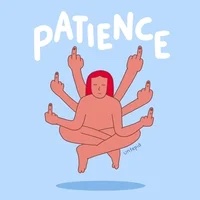As promised in the last post, more about patience–this time, on the music front. When I first came back to piano two years ago, I would constantly beat myself up mentally for not being able to play a piece well after a couple of days of practicing. Some people can fake their way through and play pretty decently just by sight-reading, but I’ve never been one of those people. I have to practice the jumps on the keyboard incessantly before I can be sure that my fingers will land in the right places. And even then, it’s never a sure thing.
What changed for me was engaging in the same process I used in writing. I’d learn a piece to the best of my ability at the current moment, then put it aside for a few weeks or months. When I came back to it, there was often a day or two where I had to ease the notes back under my fingers, but suddenly it was there, and I wasn’t thinking about the notes anymore. Instead I was thinking about the important things that differentiate “cookbook playing” from a more authentic and personal musical expression–nuance, dynamics, shading. As my fingers were finally able to fall comfortably on the notes, I had more slack to consider different ways to express the rise and fall of each phrase. Sometimes, especially with some of the technically harder pieces I’m learning, I still came across passages I couldn’t play, but I’d try as best I could to shut off the negative voices and drill some more before putting the piece away again for more simmering.
One of the first pieces I visited on my journey back to piano was Mendelssohn’s Venetian Boat Song #2. This is a fairly easy piece that I first learned somewhere between fourth and sixth grade, but I still had to struggle with all the left hand jumps and the right hand trills. And even when I got the notes down again, I could never count on a foolproof, mistake-free rendition. But recently, especially as my post-collarbone fracture arm still can’t hack too much hard practicing, I’ve pulled it out again after the third or fourth simmer, and voilà, my hands are sailing through and I can just lose myself in the bobbling waves of the canal.

My recovery from the collarbone injury has also taught me a lot about patience. I generally have about 15 good practice minutes under my belt before my arms start to ache, which has meant that learning Chopin’s Nocturne No. 19 in E Minor, a new piece I love and have never played before is taking forever. I can practice one or two phrases at a time, and then I’m tired. And the next day when I go back to the I phrases I thought I learned, I realize they’re still far from smooth. But slowly, this, too, will change. After all, a month ago, I couldn’t even raise my left arm to the height of the piano bench. I’m not one for aphorisms, but whoever said patience was a virtue knows something I’m still learning.
To subscribe to this blog, sign up at ddinafriedman.substack.com


